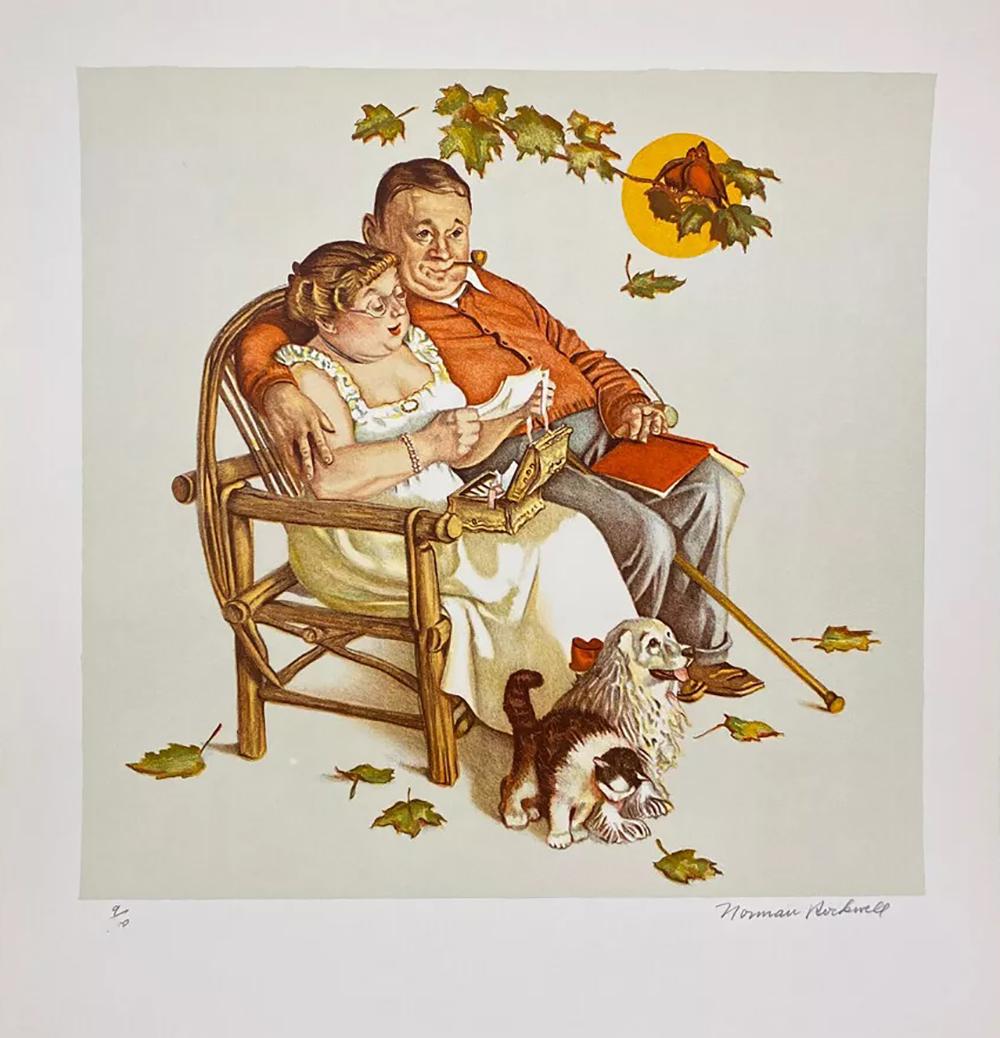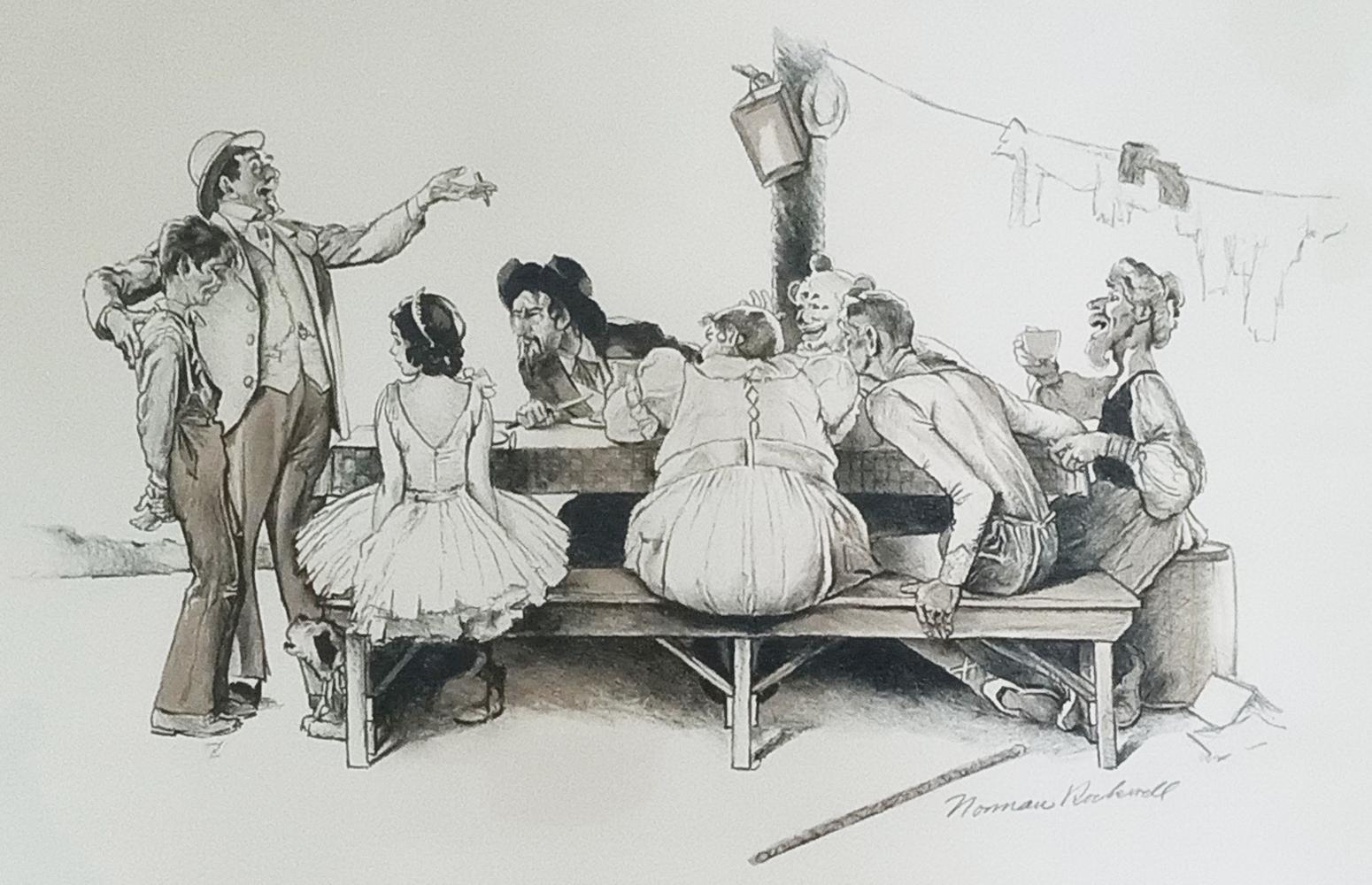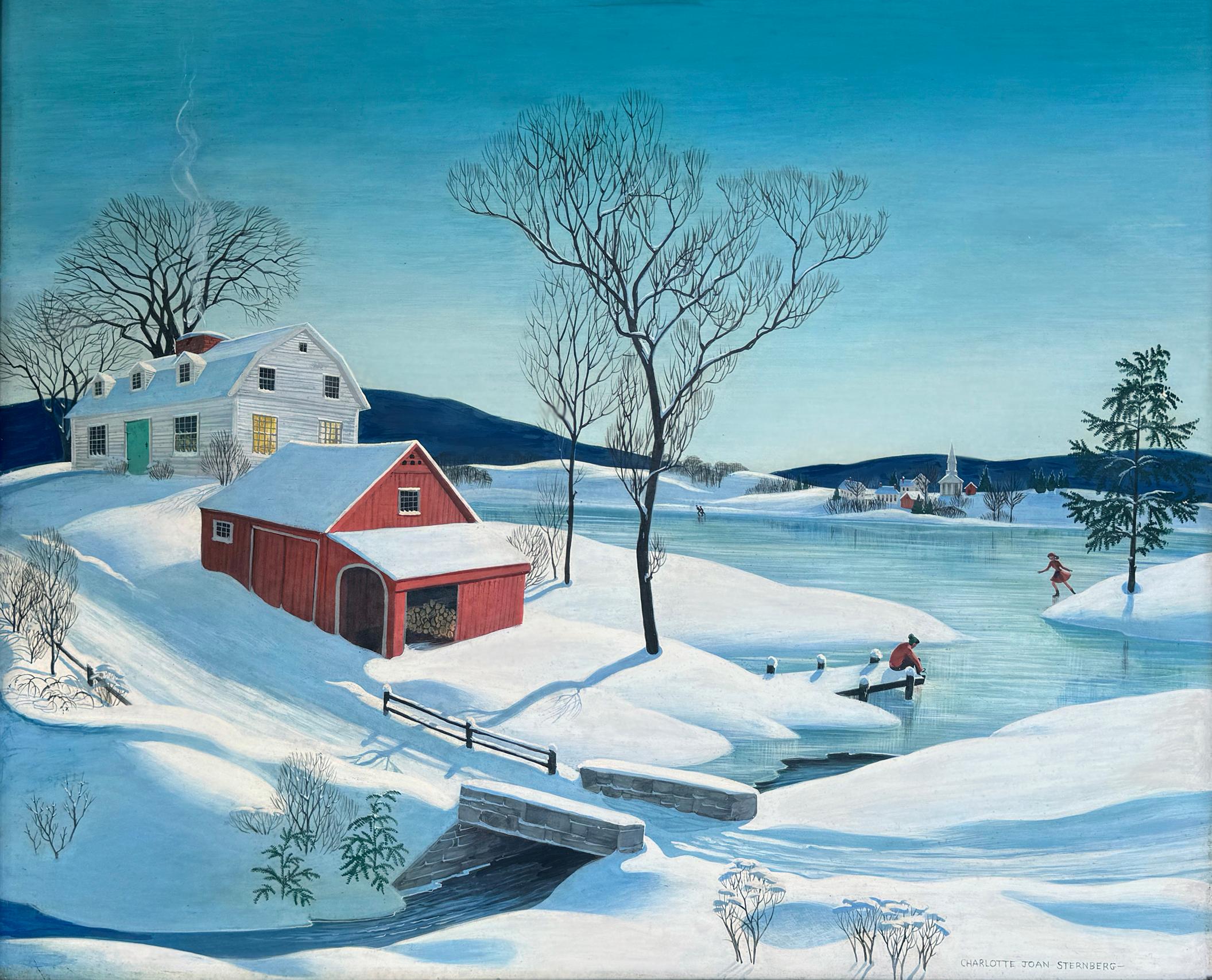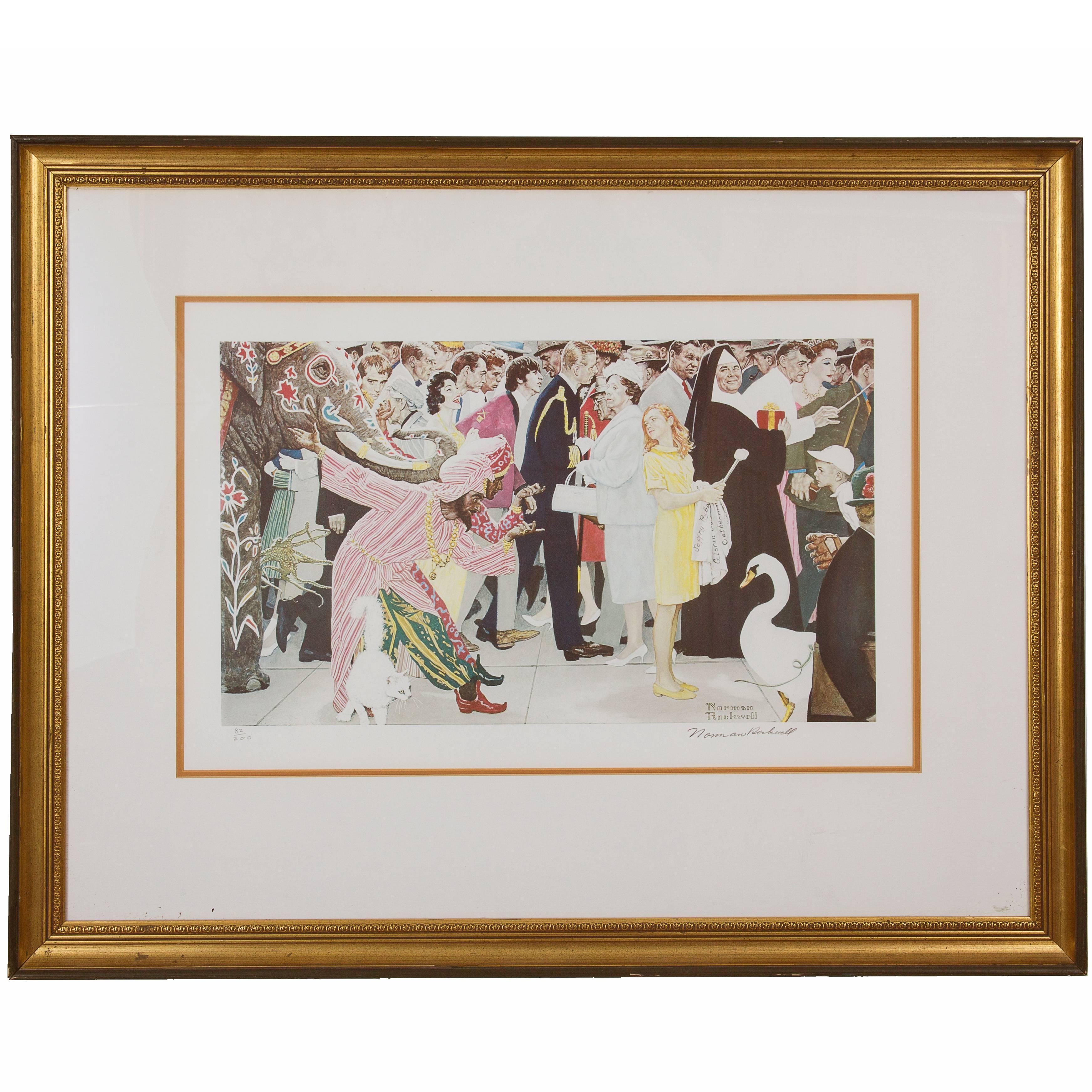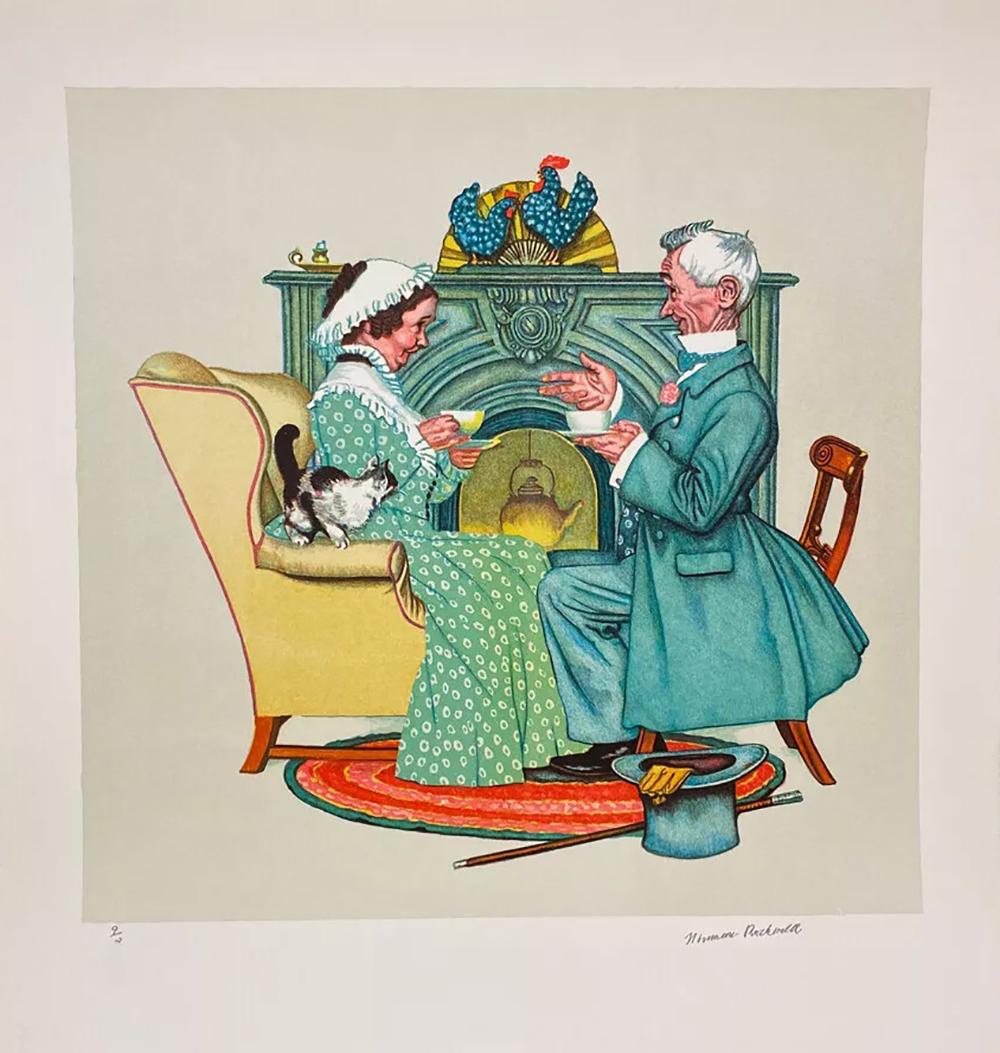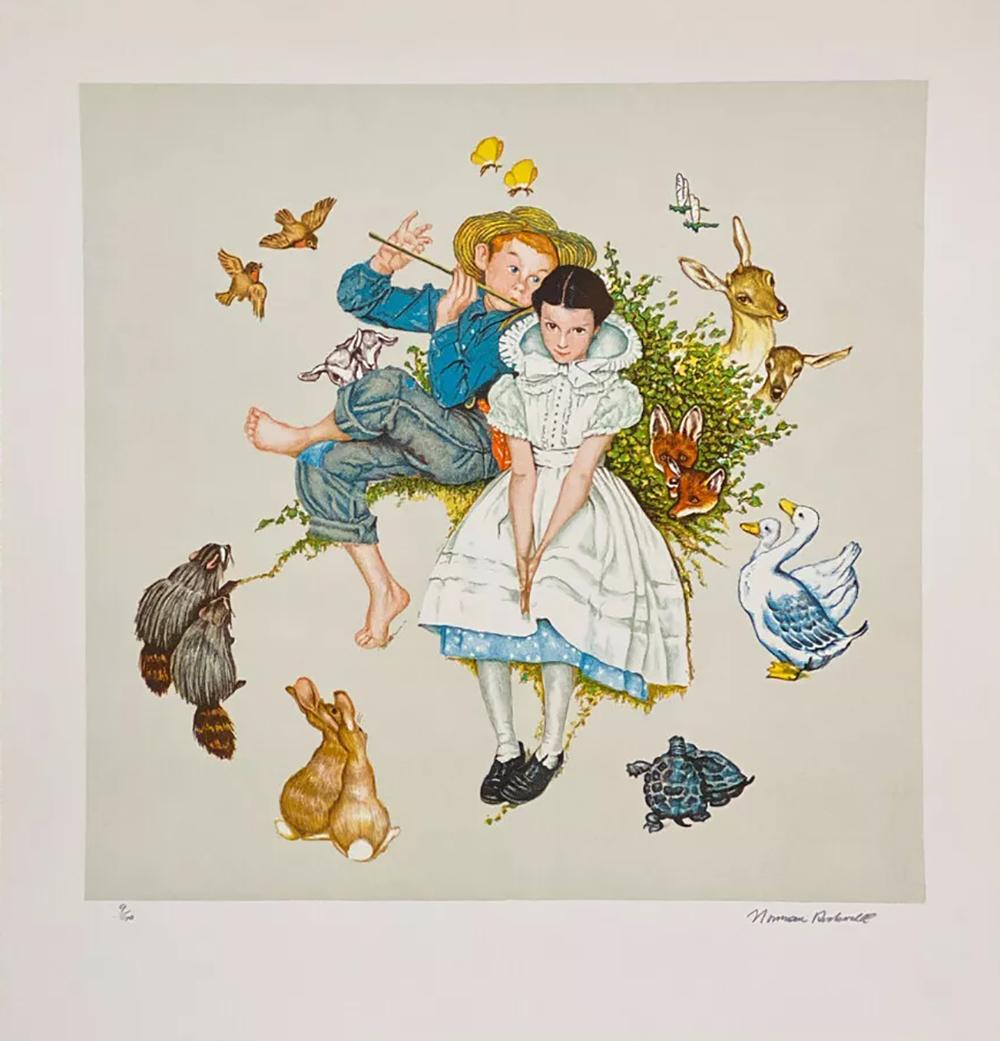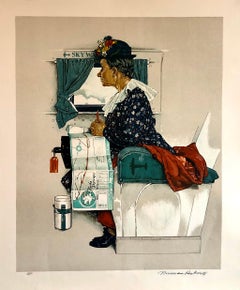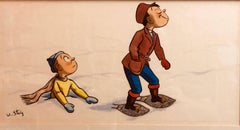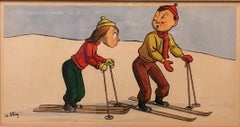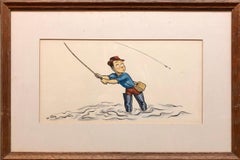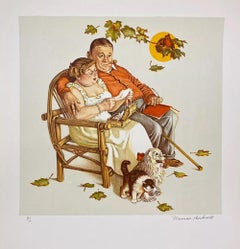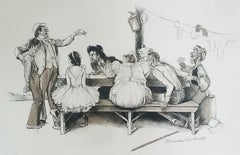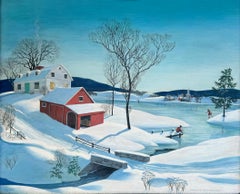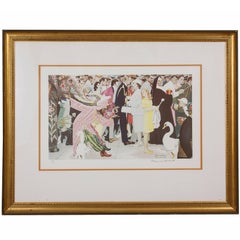Items Similar to Norman Rockwell Original Lithograph Ice Skating Hand Signed Americana
Want more images or videos?
Request additional images or videos from the seller
1 of 16
Norman Rockwell Original Lithograph Ice Skating Hand Signed Americana1976
1976
$2,600
£2,024.71
€2,303.10
CA$3,744.43
A$4,109.05
CHF 2,146.18
MX$49,128.24
NOK 27,185.12
SEK 25,355.24
DKK 17,200.91
About the Item
Norman Rockwell (1894-1978)
Ice Skating, from Grandpa and Me Suite
Offset lithograph print, hand signed in pencil, numbered AP E 9/10
27 x 23 in. (sight), 34.75 x 30 in. (frame).
Norman Percevel Rockwell (1894 – 1978) was an American author, painter and illustrator. His works have a broad popular appeal in the United States for their reflection of American culture. Rockwell is most famous for the cover illustrations of everyday life he created for The Saturday Evening Post magazine in a modern folk art style over nearly five decades. Among the best-known of Rockwell's works are the Willie Gillis series, Rosie the Riveter, The Problem We All Live With, Saying Grace, and the Four Freedoms series. He is also noted for his 64-year relationship with the Boy Scouts of America (BSA), during which he produced covers for their publication Boys' Life, calendars, and other illustrations. These works include popular images that reflect the Scout Oath and Scout Law such as The Scoutmaster, A Scout is Reverent and A Guiding Hand, among many others.
Rockwell was also commissioned to illustrate more than 40 books, including Tom Sawyer and Huckleberry Finn as well as painting the portraits for Presidents Eisenhower, Kennedy, Johnson, and Nixon, as well as those of foreign figures, including Gamal Abdel Nasser and Jawaharlal Nehru. His portrait subjects included Judy Garland. One of his last portraits was of Colonel Sanders in 1973. His most popular calendar works: the "Four Seasons" illustrations for Brown & Bigelow that were published for 17 years beginning in 1947 and reproduced in various styles and sizes since 1964. He painted six images of classic Americana for Coca-Cola advertising. Illustrations for booklets, catalogs, posters (particularly movie promotions), sheet music, stamps, playing cards, and murals (including "Yankee Doodle Dandy" and "God Bless the Hills", which was completed in 1936 for the Nassau Inn in Princeton, New Jersey) rounded out Rockwell's œuvre as an illustrator. Vladimir Nabokov wrote that Rockwell's brilliant technique was put to "banal" use, and wrote in his book Pnin: "That Salvador Dali is really Norman Rockwell's twin brother kidnapped by Gypsies in babyhood".
Rockwell transferred from high school to the Chase Art School at the age of 14. He then went on to the National Academy of Design and finally to the Art Students League. There, he was taught by Thomas Fogarty, George Bridgman, and Frank Vincent DuMond; his early works were produced for St. Nicholas Magazine, the Boy Scouts of America (BSA) magazine Boys' Life, and other youth publications.
Rockwell's family moved to New Rochelle, New York, when Norman was 21 years old. They shared a studio with the cartoonist Clyde Forsythe, who worked for The Saturday Evening Post. With Forsythe's help, Rockwell submitted his first successful cover painting to the Post in 1916, Mother's Day Off (published on May 20). He followed that success with Circus Barker and Strongman (published on June 3), Gramps at the Plate (August 5), Redhead Loves Hatty Perkins (September 16), People in a Theatre Balcony (October 14), and Man Playing Santa (December 9). Rockwell was published eight times on the Post cover within the first year. Ultimately, Rockwell published 323 original covers for The Saturday Evening Post over 47 years. Rockwell's success on the cover of the Post led to covers for other magazines of the day, most notably the Literary Digest, the Country Gentleman, Leslie's Weekly, Judge, People's Popular Monthly and Life magazine. Rockwell's work was exhibited at the Solomon R. Guggenheim Museum in 2001. Rockwell's Breaking Home Ties sold for $15.4 million at a 2006 Sotheby's auction. The 2013 sale of Saying Grace for $46 million (including buyer's premium) established a new record price for Rockwell. Along with Leroy Neiman, Peter Max, Charles Fazzino and James Rizzi he has straddled the line between fine and popular art.
Film director George Lucas owns Rockwell's original of "The Peach Crop", and his colleague Steven Spielberg owns a sketch of Rockwell's Triple Self-Portrait. Each of the artworks hangs in the respective filmmaker's work space.
- Creation Year:1976
- Dimensions:Height: 34.75 in (88.27 cm)Width: 30 in (76.2 cm)
- Medium:
- Movement & Style:
- After:Norman Rockwell (1894 - 1978, American)
- Period:
- Condition:there is no glass, I had it removed for safe shipping, frame has minor wear.
- Gallery Location:Surfside, FL
- Reference Number:1stDibs: LU38215948392
About the Seller
4.9
Platinum Seller
Premium sellers with a 4.7+ rating and 24-hour response times
Established in 1995
1stDibs seller since 2014
1,837 sales on 1stDibs
Typical response time: 1 hour
- ShippingRetrieving quote...Shipping from: Surfside, FL
- Return Policy
More From This Seller
View AllOriginal Lithograph Hand Signed Old Women Riding First Airplane Flight Americana
By After Norman Rockwell
Located in Surfside, FL
Norman Rockwell (1894-1978) First Airplane Ride/ Old Women Riding Airplane, 1938 Originally created as cover illustration for The Saturday Evening Post.
Media print lithography on paper, this twelve-color lithograph was hand proofed and printed at Atelier Ettinger in December 1976. A/P Artist Proof impression on papier d'Arches. Hand signed in pencil by Norman Rockwell. hand editioned and with publishers blindstamp.
Norman Percevel Rockwell (1894 – 1978) was an American author, painter and illustrator. His works have a broad popular appeal in the United States for their reflection of American culture. Rockwell is most famous for the cover illustrations of everyday life he created for The Saturday Evening Post magazine in a modern folk art style over nearly five decades. Among the best-known of Rockwell's works are the Willie Gillis series, Rosie the Riveter, The Problem We All Live With...
Category
1970s American Realist Figurative Prints
Materials
Lithograph
Whimsical Illustration "Snow" Cartoon, 1938 Mt Tremblant Ski Lodge William Steig
By William Steig (b.1907)
Located in Surfside, FL
Lighthearted Illustration of Outdoor Pursuits This one being cross country Snow Shoes signed "W. Steig"
Provenance: from Mrs. Joseph B. Ryan, Commissioned by ...
Category
1930s American Modern Figurative Drawings and Watercolors
Materials
India Ink, Watercolor, Illustration Board
Whimsical Illustration Skiing Cartoon, 1938 Mt Tremblant Ski Lodge William Steig
By William Steig (b.1907)
Located in Surfside, FL
Lighthearted Illustration of Outdoor Pursuits This one being a Skiing scene, a boy and a girl on skis. signed W. Steig
Provenance: from Mrs. Joseph B. Ryan, Commissioned by Joe Ryan for the bar at his ski resort, Mount Tremblant Lodge, in 1938.
Mont Tremblant, P.Q., Canada
Watercolor and ink on illustration board, sights sizes 8 1/2 x 16 1/2 in., framed.
In 1938 Joe Ryan, described as a millionaire from Philadelphia, bushwhacked his way to the summit of Mont Tremblant and was inspired to create a world class ski resort at the site. In 1939 he opened the Mont Tremblant Lodge, which remains part of the Pedestrian Village today. This original illustration is on Whatman Illustration board. the board measures 14 X 22 inches. label from McClees Galleries, Philadelphia, on the frame backing paper.
William Steig, 1907 – 2003 was an American cartoonist, sculptor, and, in his later life, an illustrator and writer of children's books. Best known for the picture books Sylvester and the Magic Pebble, Abel's Island, and Doctor De Soto, he was also the creator of Shrek!, which inspired the film series of the same name. He was the U.S. nominee for both of the biennial, international Hans Christian Andersen Awards, as a children's book illustrator in 1982 and a writer in 1988.
Steig was born in Brooklyn, New York in 1907, and grew up in the Bronx. His parents were Polish-Jewish immigrants from Austria, both socialists. His father, Joseph Steig, was a house painter, and his mother, Laura Ebel Steig, was a seamstress who encouraged his artistic leanings. As a child, he dabbled in painting and was an avid reader of literature. Among other works, he was said to have been especially fascinated by Pinocchio.He graduated from Townsend Harris High School at 15 but never completed college, though he attended three, spending two years at City College of New York, three years at the National Academy of Design and a mere five days at the Yale School of Fine Arts before dropping out of each.
Hailed as the "King of Cartoons" Steig began drawing illustrations and cartoons for The New Yorker in 1930, producing more than 2,600 drawings and 117 covers for the magazine. Steig, later, when he was 61, began writing children's books. In 1968, he wrote his first children's book. He excelled here as well, and his third book, Sylvester and the Magic Pebble (1969), won the Caldecott Medal. He went on to write more than 30 children's books, including the Doctor DeSoto series, and he continued to write into his nineties. Among his other well-known works, the picture book Shrek! (1990) formed the basis for the DreamWorks Animation film Shrek (2001). After the release of Shrek 2 in 2004, Steig became the first sole-creator of an animated movie franchise that went on to generate over $1 billion from theatrical and ancillary markets after only one sequel. Along with Maurice Sendak, Saul Steinberg, Ludwig Bemelmans and Laurent de Brunhofff his is one of those rare cartoonist whose works form part of our collective cultural heritage.
In 1984, Steig's film adaptation of Doctor DeSoto directed by Michael Sporn was nominated for the Academy Award for Best Animated Short Film. As one of the most admired cartoonists of all time, Steig spent seven decades drawing for the New Yorker magazine. He touched generations of readers with his tongue–in–cheek pen–and–ink drawings, which often expressed states of mind like shame, embarrassment or anger. Later in life, Steig turned to children's books, working as both a writer and illustrator.
Steig's children's books were also wildly popular because of the crazy, complicated language he used—words like lunatic, palsied, sequestration, and cleave. Kids love the sound of those words even if they do not quite understand the meaning. Steig's descriptions were also clever. He once described a beached whale as "breaded with sand."
Throughout the course of his career, Steig compiled his cartoons and drawings into books. Some of them were published first in the New Yorker. Others were deemed too dark to be printed there. Most of these collections centered on the cold, dark psychoanalytical truth about relationships. They featured husbands and wives fighting and parents snapping at their kids. His first adult book, Man About Town, was published in 1932, followed by About People, published in 1939, which focused on social outsiders. Sick of Each Other, published in 2000, included a drawing depicting a wife holding her husband at gunpoint, saying, "Say you adore me."
According to the Los Angeles Times, fellow New Yorker artist Edward Sorel...
Category
1930s Naturalistic Figurative Drawings and Watercolors
Materials
Archival Ink, Watercolor, Illustration Board
Whimsical Fishing Illustration Cartoon 1938 Mt Tremblant Ski Lodge William Steig
By William Steig (b.1907)
Located in Surfside, FL
Lighthearted Illustration of Outdoor Pursuits This one of a fisherman signed "W. Steig"
Provenance: from Mrs. Joseph B. Ryan, Commissioned by Joe Ryan for the bar at his ski resort, Mount Tremblant Lodge, in 1938.
Mont Tremblant, P.Q., Canada
Watercolor and ink on illustration board, sights sizes 8 1/2 x 16 1/2 in., framed.
In 1938 Joe Ryan, described as a millionaire from Philadelphia, bushwhacked his way to the summit of Mont Tremblant and was inspired to create a world class ski resort at the site. In 1939 he opened the Mont Tremblant Lodge, which remains part of the Pedestrian Village today. This original illustration is on Whatman Illustration board. the board measures 14 X 22 inches. label from McClees Galleries, Philadelphia, on the frame backing paper.
William Steig, 1907 – 2003 was an American cartoonist, sculptor, and, in his later life, an illustrator and writer of children's books. Best known for the picture books Sylvester and the Magic Pebble, Abel's Island, and Doctor De Soto, he was also the creator of Shrek!, which inspired the film series of the same name. He was the U.S. nominee for both of the biennial, international Hans Christian Andersen Awards, as a children's book illustrator in 1982 and a writer in 1988.
Steig was born in Brooklyn, New York in 1907, and grew up in the Bronx. His parents were Polish-Jewish immigrants from Austria, both socialists. His father, Joseph Steig, was a house painter, and his mother, Laura Ebel Steig, was a seamstress who encouraged his artistic leanings. As a child, he dabbled in painting and was an avid reader of literature. Among other works, he was said to have been especially fascinated by Pinocchio.He graduated from Townsend Harris High School at 15 but never completed college, though he attended three, spending two years at City College of New York, three years at the National Academy of Design and a mere five days at the Yale School of Fine Arts before dropping out of each.
Hailed as the "King of Cartoons" Steig began drawing illustrations and cartoons for The New Yorker in 1930, producing more than 2,600 drawings and 117 covers for the magazine. Steig, later, when he was 61, began writing children's books. In 1968, he wrote his first children's book. He excelled here as well, and his third book, Sylvester and the Magic Pebble (1969), won the Caldecott Medal. He went on to write more than 30 children's books, including the Doctor DeSoto series, and he continued to write into his nineties. Among his other well-known works, the picture book Shrek! (1990) formed the basis for the DreamWorks Animation film Shrek (2001). After the release of Shrek 2 in 2004, Steig became the first sole-creator of an animated movie franchise that went on to generate over $1 billion from theatrical and ancillary markets after only one sequel. Along with Maurice Sendak, Saul Steinberg, Ludwig Bemelmans and Laurent de Brunhofff his is one of those rare cartoonist whose works form part of our collective cultural heritage.
In 1984, Steig's film adaptation of Doctor DeSoto directed by Michael Sporn was nominated for the Academy Award for Best Animated Short Film. As one of the most admired cartoonists of all time, Steig spent seven decades drawing for the New Yorker magazine. He touched generations of readers with his tongue–in–cheek pen–and–ink drawings, which often expressed states of mind like shame, embarrassment or anger. Later in life, Steig turned to children's books, working as both a writer and illustrator.
Steig's children's books were also wildly popular because of the crazy, complicated language he used—words like lunatic, palsied, sequestration, and cleave. Kids love the sound of those words even if they do not quite understand the meaning. Steig's descriptions were also clever. He once described a beached whale as "breaded with sand."
Throughout the course of his career, Steig compiled his cartoons and drawings into books. Some of them were published first in the New Yorker. Others were deemed too dark to be printed there. Most of these collections centered on the cold, dark psychoanalytical truth about relationships. They featured husbands and wives fighting and parents snapping at their kids. His first adult book, Man About Town, was published in 1932, followed by About People, published in 1939, which focused on social outsiders. Sick of Each Other, published in 2000, included a drawing depicting a wife holding her husband at gunpoint, saying, "Say you adore me."
According to the Los Angeles Times, fellow New Yorker artist...
Category
1930s American Modern Figurative Drawings and Watercolors
Materials
India Ink, Watercolor, Illustration Board
Vintage Russian Ukrainian Shtetl Scene Judaica Lithograph Jewish Portrait
By Anatoli Lvovich Kaplan
Located in Surfside, FL
Pencil signed and dated, Judaica Lithograph.
Anatoli Lwowitch Kaplan was a Russian painter, sculptor and printmaker, whose works often reflect his Jewish origins.
His father was a b...
Category
Mid-20th Century Modern Figurative Prints
Materials
Lithograph
Hand Colored Etching Vintage Hollywood Legends Etching with Watercolor Painting
By Ann Chernow
Located in Surfside, FL
Titled: Avalon
Ann Chernow (Connecticut b. 1936) etching. hand signed 'Ann Chernow' in pencil lower right. Numbered '5/15' in pencil lower left. Titled in pencil lower center. Sheet ...
Category
1990s Pop Art Figurative Prints
Materials
Watercolor, Etching
You May Also Like
Norman Rockwell 'Fondly Do We Remember' 1977, signed & numbered lithograph
By Norman Rockwell
Located in Pembroke Pines, FL
"Fondly Do We Remember" From the Four Ages of Love Suite
by
Norman Rockwell
Media: Lithograph on Paper
Image Dimensions: 21" x 22"
Year Produced: 1977
Edition Size: 200 Numbered (1-200), 60 Artists Proofs (1-60)
Edition Number: A/P (Artist proof)
Signed and Numbered in pencil by the artist
Condition: In excellent condition
Norman Rockwell was an American painter and illustrator known for his iconic depictions of American culture created for The Saturday Evening Post. With a range of favorite subjects that included nuclear families, mischievous children, and small-town life, his work has achieved an iconic status: the 1943 painting of a Thanksgiving dinner, Freedom from Want, has been reproduced and parodied countless times in contemporary culture. As an artist, Rockwell has had a lasting effect on US society beyond any singular work, with his paintings seen as indelible images that went on to inspire American directors such as George Lucas, Steven Spielberg, and particularly Robert Zemeckis, whose 1994 film Forrest Gump recreates several of Rockwell’s paintings as scenes throughout the film. Though he enjoyed success throughout his career, Rockwell’s idyllic and sentimental outlook on American society was not necessarily embraced by art critics, though his later politically activist work garnered praise for its tackling of controversial subjects. Born on February 3, 1894 in New York, NY, he went on to study at the National Academy of Design and the Art Students League. Rockwell notably had a longstanding relationship with the Boy Scouts...
Category
1970s Photorealist Prints and Multiples
Materials
Lithograph
Norman Rockwell Framed Lithograph Willie takes a step - 1971.
By Norman Rockwell
Located in Pembroke Pines, FL
Artist: Norman Rockwell
Title: Willie Takes a Step
Year: 1971
Dimensions: 18 x 24 Inches.
Framed Approx.: 24 x 30 Inches.
Edition: 69/200
Medium: Lithograph
Condition: Excellent
Sig...
Category
1970s Contemporary Figurative Prints
Materials
Lithograph
Americana Winter Scene Ice Skaters Mid-Century- Norman Rockwell America
By Charlotte Sternberg
Located in Miami, FL
This charming rural winter scene of ice skaters fully displays Norman Rockwell's America, but it was painted by female artist Charlotte Joan Sternberg. She combines the mid-century A...
Category
1950s American Realist Landscape Paintings
Materials
Egg Tempera
Norman Rockwell Limited Edition Collotype 'Saturday People'
By Norman Rockwell
Located in WEST PALM BEACH, FL
Limited edition and certified collotype of 'Saturday People' by Norman Rockwell. Signed in pencil by Rockwell and numbered 82 of 100.
Category
Vintage 1960s American Other Prints
Materials
Paper
Norman Rockwell 'Gaily Sharing Vintage Time' 1977, signed & numbered lithograph
By Norman Rockwell
Located in Pembroke Pines, FL
"Gaily Sharing Vintage Times" From the Four Ages of Love Suite
by
Norman Rockwell
Media: Lithograph on Paper
Image Dimensions: 21" x 22"
Year Produced: 1977
Edition Size: 200 Numbered (1-200), 60 Artists Proofs (1-60)
Edition Number: A/P (Artist proof)
Signed and Numbered in pencil by the artist
Condition: In excellent condition
Norman Rockwell was an American painter and illustrator known for his iconic depictions of American culture created for The Saturday Evening Post. With a range of favorite subjects that included nuclear families, mischievous children, and small-town life, his work has achieved an iconic status: the 1943 painting of a Thanksgiving dinner, Freedom from Want, has been reproduced and parodied countless times in contemporary culture. As an artist, Rockwell has had a lasting effect on US society beyond any singular work, with his paintings seen as indelible images that went on to inspire American directors such as George Lucas, Steven Spielberg, and particularly Robert Zemeckis, whose 1994 film Forrest Gump recreates several of Rockwell’s paintings as scenes throughout the film. Though he enjoyed success throughout his career, Rockwell’s idyllic and sentimental outlook on American society was not necessarily embraced by art critics, though his later politically activist work garnered praise for its tackling of controversial subjects. Born on February 3, 1894 in New York, NY, he went on to study at the National Academy of Design and the Art Students League. Rockwell notably had a longstanding relationship with the Boy Scouts of America...
Category
1970s Photorealist Prints and Multiples
Materials
Lithograph
Norman Rockwell 'Sweet Song So Young' 1977, signed & numbered lithograph
By Norman Rockwell
Located in Pembroke Pines, FL
"Sweet Song So Young" From the Four Ages of Love Suite
by
Norman Rockwell
Media: Lithograph on Paper
Image Dimensions: 21" x 22"
Year Produced: 1977
Edition Size: 200 Numbered (1-200), 60 Artists Proofs (1-60)
Edition Number: A/P (Artist proof)
Signed and Numbered in pencil by the artist
Condition: In excellent condition
Norman Rockwell was an American painter and illustrator known for his iconic depictions of American culture created for The Saturday Evening Post. With a range of favorite subjects that included nuclear families, mischievous children, and small-town life, his work has achieved an iconic status: the 1943 painting of a Thanksgiving dinner, Freedom from Want, has been reproduced and parodied countless times in contemporary culture. As an artist, Rockwell has had a lasting effect on US society beyond any singular work, with his paintings seen as indelible images that went on to inspire American directors such as George Lucas, Steven Spielberg, and particularly Robert Zemeckis, whose 1994 film Forrest Gump recreates several of Rockwell’s paintings as scenes throughout the film. Though he enjoyed success throughout his career, Rockwell’s idyllic and sentimental outlook on American society was not necessarily embraced by art critics, though his later politically activist work garnered praise for its tackling of controversial subjects. Born on February 3, 1894 in New York, NY, he went on to study at the National Academy of Design and the Art Students League. Rockwell notably had a longstanding relationship with the Boy Scouts...
Category
1970s Photorealist Prints and Multiples
Materials
Lithograph
More Ways To Browse
Vintage Ice Signs
Vintage Americana Signs
The Physiognomy Ear
Van Strydonck
Venus In Furs
Vintage Continental Airlines Poster
Vintage Lunch Counter
Warhol Alexander
Warhol Batman
Warhol Flash
Western Etchings
Will Barnet Serigraph
Willis Wine Bar
Ww2 Propaganda Posters
Yoshitomo Nara Miss Spring
Yves Klein Blue Art
1959 Bullfight Picasso
727 Murakami
